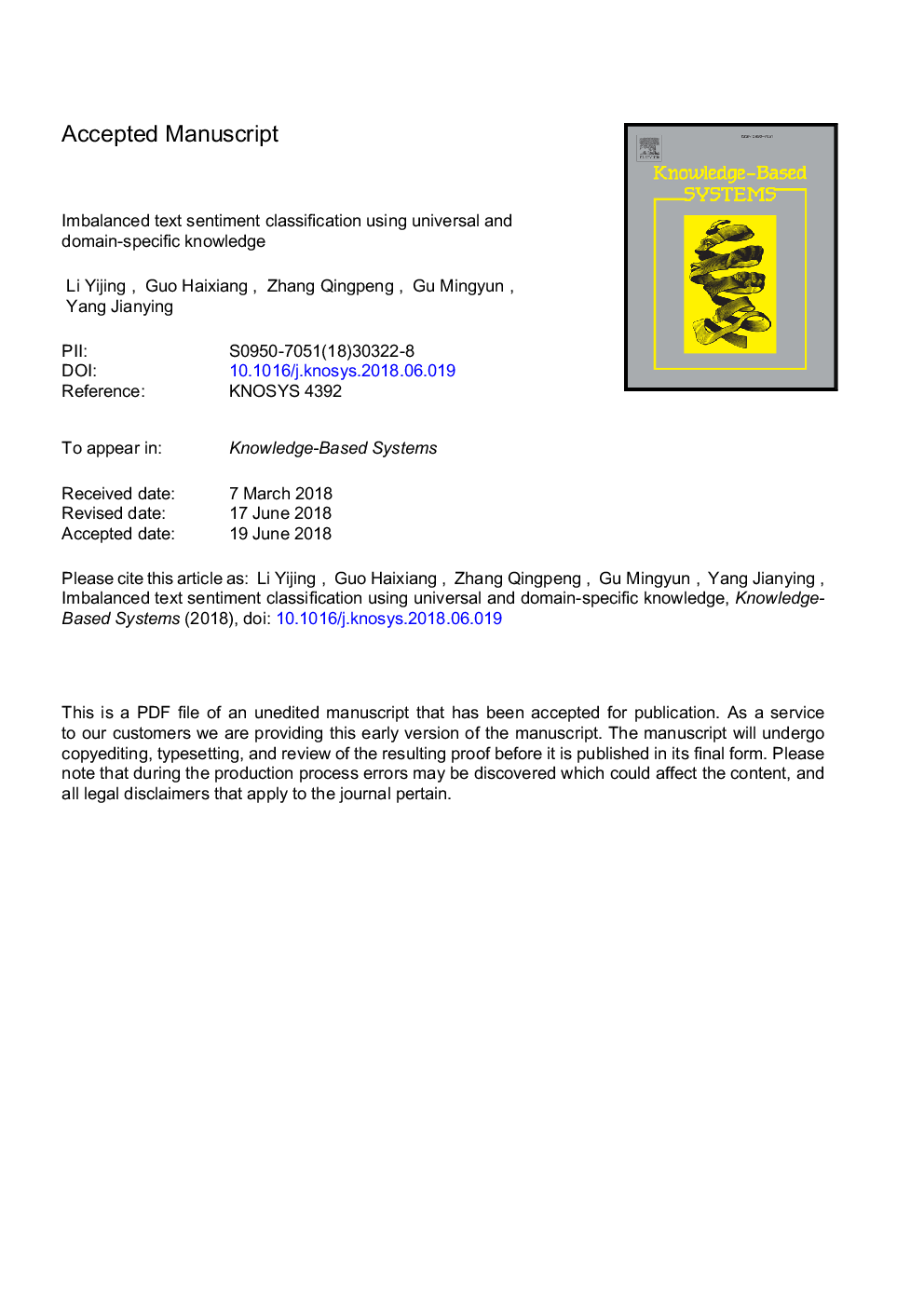| کد مقاله | کد نشریه | سال انتشار | مقاله انگلیسی | نسخه تمام متن |
|---|---|---|---|---|
| 10150978 | 1666104 | 2018 | 34 صفحه PDF | دانلود رایگان |
عنوان انگلیسی مقاله ISI
Imbalanced text sentiment classification using universal and domain-specific knowledge
ترجمه فارسی عنوان
طبقه بندی احساسات متناسب با استفاده از دانش جهانی و دامنه خاص
دانلود مقاله + سفارش ترجمه
دانلود مقاله ISI انگلیسی
رایگان برای ایرانیان
کلمات کلیدی
تجزیه و تحلیل احساسات، پخش برچسب، داده های نامتعادل یادگیری گروهی
ترجمه چکیده
در این مقاله، یک مدل طبقه بندی احساسات برای رفع دو مسئله مهم در دسته بندی احساسات، یعنی حساس به دامنه و عدم تعادل داده ها، پیشنهاد شده است. از آنجا که کلمات ممکن است قطبیت های متمایز احساسات را در زمینه های مختلف جاسازی کنند، طبقه بندی احساسات به طور گسترده ای به عنوان یک کار حساس به دامنه مطرح می شود. بر این اساس، این مقاله بر روی انتشار برچسب به منظور ایجاد واژگان جهانی و دامنه خاص احساسات و تدوین یک مدل طبقه بندی احساسات تطبیقی دامنه که دانش عمومی و دامنه خاص را به یک چارچوب یادگیری یکپارچه تبدیل می کند. در طرف مقابل، جسد مربوط به احساسات معمولا با توزیع قطبی پوشیده شده است، زیرا افراد تمایل دارند معیارهای ارزیابی مشابه را در یک شیء مشخص به اشتراک بگذارند و بنابراین قطبیت احساسات آنها نسبت به یک هدف مشابه احتمالا مشابه است. ما تلاش می کنیم با بروز یک روش جدید از نمونه برداری جدید از این مشکل داده های نامتقارن برخورد کنیم. بر خلاف رویکردهای بیش از حد نمونه برداری که نمونه های کلاس اقلیت را از فضای ویژگی عددی تولید می کنند، روش نمونه گیری پیشنهاد شده مستقیما متون مصنوعی را از فضاهای کلمه ایجاد می کند. چندین آزمایش انجام شده برای تأیید اثربخشی روش تولید نسبی واژگان، چارچوب یادگیری و روش نمونه گیری بیش از حد انجام شده است. نتایج نشان می دهد که واژگان احساسات القا شده قابل تفسیر است و مدل پیشنهادی برای طبقه بندی احساسات متفاوتی با عدم تعادل و متن خاص موثر است.
موضوعات مرتبط
مهندسی و علوم پایه
مهندسی کامپیوتر
هوش مصنوعی
چکیده انگلیسی
In this paper, a sentiment classification model is proposed to address two predominant issues in sentiment classification, namely domain-sensitive and data imbalance. Since words may embed distinct sentiment polarities in different contexts, sentiment classification is widely contended as a domain-sensitive task. Accordingly, this paper draws on label propagation to induce universal and domain-specific sentiment lexicons and builds a domain-adaptive sentiment classification model that incorporates universal and domain-specific knowledge into a unified learning framework. On the flip side, sentiment-related corpuses are usually formed with skewed polarity distribution because individuals tend to share similar assessment criteria on a given object and hence their sentiment polarities toward the same object are likely to be similar. We endeavor to address such imbalanced data problem by advancing a novel over-sampling technique. Unlike existing over-sampling approaches that generate minority-class samples from numerical feature space, the proposed sampling method directly creates synthetic texts from word spaces. Several experiments are conducted to verify the effectiveness of the proposed lexicon generation method, learning framework, and over-sampling method. Results show that the induced sentiment lexicons are interpretable and the proposed model is found to be effective for imbalanced and domain-specific text sentiment classification.
ناشر
Database: Elsevier - ScienceDirect (ساینس دایرکت)
Journal: Knowledge-Based Systems - Volume 160, 15 November 2018, Pages 1-15
Journal: Knowledge-Based Systems - Volume 160, 15 November 2018, Pages 1-15
نویسندگان
Yijing Li, Haixiang Guo, Qingpeng Zhang, Mingyun Gu, Jianying Yang,
